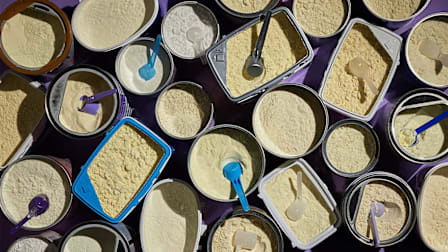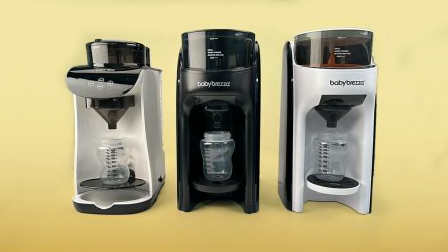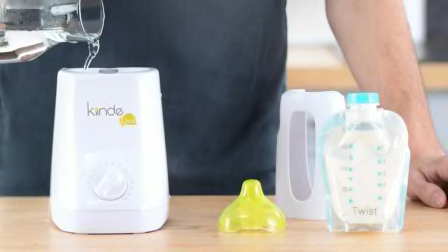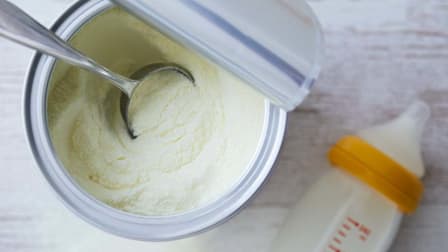FDA's Handling of Infant Formula Recall Should Be Investigated, Lawmaker Says
The request follows new reports of illnesses linked to Abbott Nutrition’s recall of certain Similac, Alimentum, and EleCare products
U.S. Rep. Rosa DeLauro on Thursday called for a federal watchdog to investigate the Food and Drug Administration’s handling of a recent recall involving infant formula. The products have been linked to two deaths and multiple serious bacterial illnesses.
The request by DeLauro, D-Conn., comes as a sweeping recall by Abbott Nutrition of infant formula expanded this week, after new reports of illnesses associated with an additional product produced at the company’s Michigan facility.
I am concerned the agency acted too slowly in pulling potentially dangerous infant formula off store shelves, which may have resulted in additional illnesses and death.
The FDA has declined to answer questions from Consumer Reports about why an inspector was at the facility last fall, and what the agency knew at the time. On Thursday, the agency simply told CR: “Our top priority is ensuring that any recalled product produced at this facility is taken off the market.”
The FDA didn’t warn consumers about the infant formula until a follow-up inspection in January uncovered cronobacter in several samples taken at Abbott’s facility. Abbott issued a recall soon after.
That FDA inspection also turned up internal Abbott records that showed the company had previously destroyed products because of the presence of cronobacter.
Abbott says the formula in question was destroyed in June 2020 after testing that is required before products can be released, CR first reported. None of that formula was distributed for sale, the company says.
But the issue was not documented in a summary of the FDA’s inspection from last September.
“The FDA has yet to explain why,” DeLauro wrote. The agency may have been able to act much sooner, CR’s reporting suggested, particularly because it has had authority to issue mandatory recalls for infant formula since the 1980s.
DeLauro asked the inspector general to find out why it took the FDA several months to return to the Abbott plant, whether the agency sought out records of the company destroying product in June 2020 during the inspection last September, and if the FDA will conduct its own tests of infant formula.
“It’s especially disturbing that the FDA hasn’t been forthcoming with information to parents and caregivers,” says Brian Ronholm, CR’s director of food policy, “so it’s not surprising that this would get the attention of a key lawmaker to scrutinize the agency’s actions.”
An Abbott spokesperson didn’t have an immediate response to DeLauro’s letter. But in a statement issued after the recall was expanded, the company said it acted after learning that an infant who had consumed a Similac product tested positive for cronobacter and died.
“This case is under investigation, and at this time the cause of the infant’s Cronobacter sakazakii infection has not been determined,” Abbott says. “We want to extend our heartfelt sympathies to the family.”
The FDA said last week that, after reports of formula shortages around the U.S., the agency is working with Abbott to address supply chain issues and safely restart production at the company’s facility.
DeLauro’s request follows a demand last week by two U.S. senators, Patty Murray, D-Wash., and Bob Casey, D-Pa., to Abbott to provide information on the company’s handling of the recall.
What to Know About the Recall
To see whether a product is part of the recall, check the lot codes on the bottom of the container for the following three markings:
- 22 through 37 as the first two digits in the code
- K8, SH, or Z2 as part of the code
- An expiration date of 4-1-2022 (APR 2022) or later
In addition, Abbott has recalled a Similac PM 60/40 powdered infant formula with the lot code 27032K800. This is a specialty formula for certain infants who would benefit from lowered mineral intake.
A full list of the recalled products hasn’t been made available to the public. Instead, the company said consumers can use a lookup tool to find out whether a product they have is part of the recall. If it is, they can call Abbott Nutrition at 800-986-8540 for information on how to obtain a refund.
If you have recalled Abbott products, the FDA recommends not using them. It says the recall doesn’t include liquid formula products or metabolic deficiency nutrition formulas, and advises that consumers should continue to use products not covered in the recall.
Cronobacter bacteria can cause severe, life-threatening infections such as sepsis and meningitis, an inflammation of the membranes that protect the brain and spine. Symptoms include poor feeding, irritability, temperature changes, and jaundice. Infection may also cause bowel damage and could spread through the blood to other parts of the body.
The FDA says that if your child is experiencing those symptoms, immediately notify your child’s doctor and seek medical care. And the agency encourages healthcare providers and health departments to report confirmed cases to the CDC.
Note that if you purchased affected infant formula with SNAP benefits, you now may be able to exchange it for products not typically covered by the program. Check with your retailer for details.

